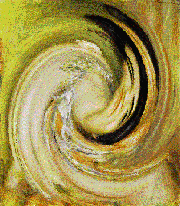Annabelle Thompson

I am the child of gamblers.
My mother gambled on my father. Mother was brought up in a three-storey house. When she was sixteen, in New York City for the summer, she fell in love with a twenty-one-year-old limo driver. His appeal, beyond his dark good looks, lay in the fact that he was a self-professed mathematical genius. She believed him when he said he could make a million in Las Vegas. Despite her parents' insistence that he was a "common hood", she married him. The odds were all wrong, of course: this was a heartbreak waiting to happen.
In two years he had saved up enough money to go to Vegas. He left my mother behind, pregnant, in a small apartment in New Jersey. She went back home to my grandparents', took the veil of guilt, raised me while she waited tables in a Howard Johnson's Restaurant, and calculated her odds on finding a rich husband (slim-to-none). A perfectly-plotted spiral.
At about thirteen, I was the terror of everyone's existence. Dyed my hair royal blue, tried pot, and hung out late with my friends. When I was grounded forever, I insisted on going to live with my father. I'd visited Las Vegas a few times and it seemed so much more fun, so free. Of course, every time I had come to visit Father, he'd rented a hotel room in Caesar's Palace and taken me to the buffets in all the other big hotels, let me play the slots.
Once there for good, though, I found that he actually lived in a dumpy little house with a dirt yard and one cactus. He wasn't a millionaire.
While I went to school in North Las Vegas, my real education came from my father. He gambled all night, slept all morning, and, afternoons, hung out by the air conditioner in the kitchen waiting for me to get home. He'd have the cards ready when I came through the door. We played blackjack, poker. He was always working on a new system. He believed there was a secret in the numbers--an optimum combination that could be discovered. He worked with Fibonacci sequences for a long time--he could get a string going, but he didn't know when to quit.
In the meantime, I dropped out of school, got a fake ID, and began going to the casinos with my father. I played a little blackjack, to learn to count cards better, but mostly I was the observer, the note taker. The other gamblers probably thought I was my father's bimbo girlfriend, because they talked about everything right in front of me as though I wasn't there, like you do with a deaf person or something. And what I observed, what I took note of was this: it was all a gamble. People thought that Vegas was the place to take risks, but they were living in a whole world of probability. The mink-coat lady, at the roulette wheel with her red-faced husband, was thrilled at the chance of 34 coming up, yet she never noticed the odds against her husband living past 55.
Real odds. Real odd.
Some people grow up seeing the world in terms of appearances, or class differences, or money. I grew up seeing everything in terms of estimating probability. How long does this streak run? When does this affair start? How many gamblers will be at the table? How long before she gets left behind? Where is the end point?
It makes life interesting, but it spoils things, too. I can't even adopt a dog from the pound without figuring how long it will live, what the chances are that it will be hit by a car or get a part in a movie.
I dealt at South Tahoe for a while, but then I wanted to start my own business, so I came to Los Angeles. I ran into a fortune teller in Simi Valley who told me that people already knew the future, what they wanted was to buy a different one. That gave me the idea. I've been doing insurance for about eight years. The few people who know my story always ask why I don't just gamble in Vegas. The odds in the casinos favor the owners; I prefer to be the house.
Life is a recurrence sequence.
Begin/ThePlace/ThePeople/TheNumbers/Headline News/Letters/FeatureStory/YoursTruly/RandomQuotes/End